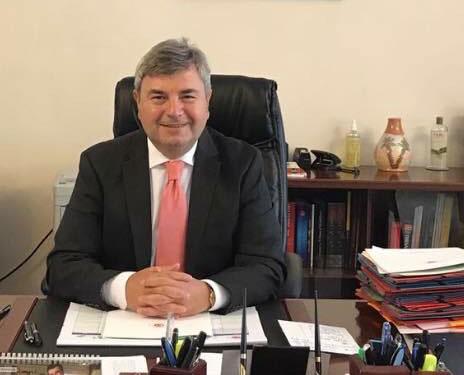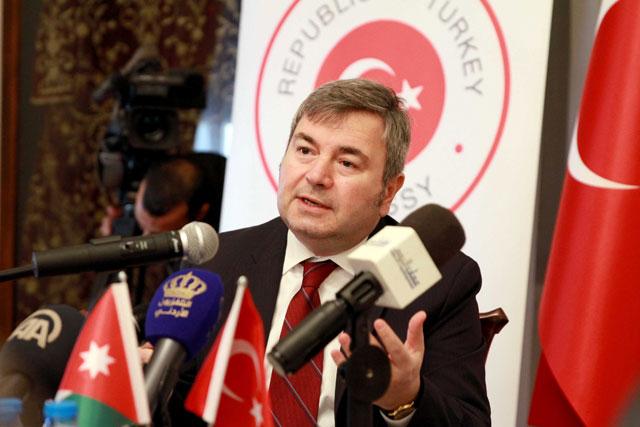You are here
Amman, Ankara see eye to eye on regional issues — ambassador
By Mohammad Ghazal - Oct 28,2017 - Last updated at Oct 28,2017

Murat Karagöz
AMMAN — Jordan and Turkey, which face many common challenges, see eye to eye on several issues and benefit from increased cooperation and trade exchange for untapped markets, according to Turkish Ambassador in Amman Murat Karagöz.
This year, the two countries mark the 70th anniversary of their diplomatic ties, but more needs to be done to increase cooperation to find common solutions to the challenges they face including the fight against terrorism, the civil war in Syria, Iraq’s instability, the influx of refugees and impeded trade routes, said the ambassador in a recent interview with The Jordan Times on the occasion of the 94th Turkish National Day, which the embassy will mark on Sunday.
“Jordan and Turkey, for example, share similar views when it comes to the Palestinian issue and Jerusalem and other issues…There are more overlapping issues in our bilateral and regional and international agendas and therefore I believe that Turkey and Jordan need each other,” said the ambassador, adding that political ties between the two states were in “good shape”.
On the free trade agreement that went into effect in 2011, the ambassador said the agreement coupled with visa free travel regime and mutual direct flights were key pillars for economic cooperation between the two countries.
Jordanian officials and businesspeople, however, have recently claimed that the deal did not impact Jordanian economy positively nor increased Jordan’s exports to Turkey.
“I understand the Jordanian businessmen and sympathise with their claims that they did not benefit… We need to do our best to balance the trade exchange, broaden it and deepen it,” the ambassador said.
“I can understand, to a certain extent, the criticism that is accelerated by the situation in the region,” he added, saying that the situation in Syria and Iraq, along with the Palestinian issue and the Gulf crisis, made matters worse.
The ambassador said the remedy was not to cancel the free trade agreement or linger on the message that it needs to be reviewed.
“We should rather check how we can make the existing agreement more beneficial through its current form,” he said.
In 2014, we reached $1 billion trade exchange. In 2016, it declined to $820 million due to regional conditions.
This year, trade exchange is expected to be similar to the volume in 2016, said the ambassador.
“Jordan’s exports to Turkey are limited. There is an imbalance of one to six. Most of it is Turkish exports to Jordan,” he said.
To increase Jordanian exports to Turkey, the ambassador said there was a need for increased participation by Jordanian businesspeople in Turkish trade fairs to promote their industries and businesses.
“We already buy potash and some agricultural material from Jordan, but there is also potential for exploring new areas such as tourism, renewable energy and the medicine.”
Turkish government, he said, was also exerting its utmost efforts to encourage Turkish investors to come to Jordan for businesses.
Direct Turkish investments in Jordan stand at about $300 million, which is “not enough”.
“We also need Jordan to promote itself more to show them why they should come and invest here. Jordan should not stand still. It takes two to tango,” said the ambassador.
The diplomat added that Turkey was willing to increase technical assistance to Jordan “but we need guidance on which areas, is it SMEs, tourism, any other field”.
On tourism, Karagöz said some 210,000 Jordanians visited Turkey in 2016.
The ambassador, who said there were no exact figures about the number of Turkish tourists to Jordan, noted that the Kingdom has so much to offer including Petra, Ajloun, Jerash, Wadi Rum, among other places.
“I believe that with reasonable and affordable prices and packages the number of Turkish visitors will increase,” he added.
On cooperation in the field of education, the ambassador said 800 Jordanian students are currently in Turkey majoring in business administration, management and social sciences.
“We offer 50 to 60 scholarships to Jordanian students every year and we hope to increase the number…we welcome students to apply through the embassy’s website. These scholarships are fully paid,” he added.
According to the diplomat, there are 100 Turkish students studying Arabic and Islamic studies in Jordan “and are very happy here”.
Stressing that Turkey is an island of stability in the region, the ambassador said: “Turkey is a democratic, social, secular state governed by rule of law.”
In spite of all challenges and last year’s failed coup, Turkey is the sixth largest economy in Europe and the 17th largest economy in the world, he said.
The ambassador added that mega projects in Turkey were under way including building an airport, which will be the largest in the world.
Related Articles
AMMAN — President and board members of the Amman Chamber of Commerce (ACC) on Wednesday discussed with Turkish Ambassador to Jordan Murat Ka
AMMAN — Prime Minister Hani Mulki's one-day visit to Ankara on Tuesday will include bilateral discussions on several political and economic
AMMAN — A series of activities will be held during the upcoming period in celebration of the passage of 70 years since the establishment of
















